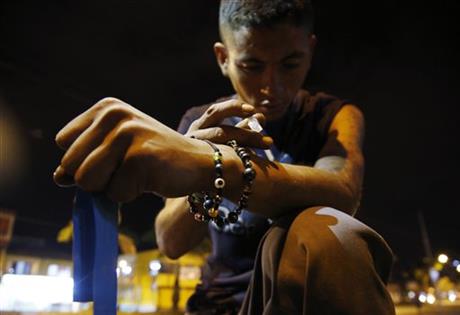Clean needles provided to Colombia heroin users
DOSQUEBRADAS, COLOMBIA: As night falls, heroin addicts walk toward a white truck distributing rubber tubes, syringes and sterilized water.
The kits come from a group called Cambie — Spanish for change. Every evening, the Cambie team combs the industrial town for addicts, hoping to swap new syringes for used ones so they don't end up in public parks, where children can step on them or they can be reused by other addicts, increasing the risk of HIV or hepatitis transmission.
Team members are nonjudgmental.
Social worker Hugo Castro doesn't reproach 39-year-old Wilson Pineda as he shows him how to tie a tourniquet over his arm to tap a vein instead of hitting a muscle.
"Sometimes I come every day. Other times I'm asleep because I'm so high," says Pineda, who said he's been shooting up for three years.
The 18-month-old pilot program, supported by philanthropist George Soros' Open Society Foundations, has attracted attention in a country long identified with the war on drugs. Here, programs for users have received scant support compared to the billions of dollars spent pursuing powerful drug cartels.
But now, faced with a dramatic rise in drug consumption, Colombia's Health Ministry hopes to replicate the needle exchange program in other cities such as Bogota and Medellin.
More than 900 addicts in Dosquebradas and the neighboring city of Pereira have received help to date from Cambie. The group, comprised of recovering addicts, also tests illicit drugs for their purity so junkies can see what dangerous adulterants they're consuming.
The program builds trust with mostly poor youth, giving them someone to turn to if they decide to kick the habit.
Colombia is one of only two heroin producers in the Western Hemisphere and the largest supplier of cocaine to the U.S. Drug consumption in the country is rising fast, with 12.2 percent of adults reporting narcotics use in the latest national drug survey in 2013 compared with 8.8 percent in 2008.






